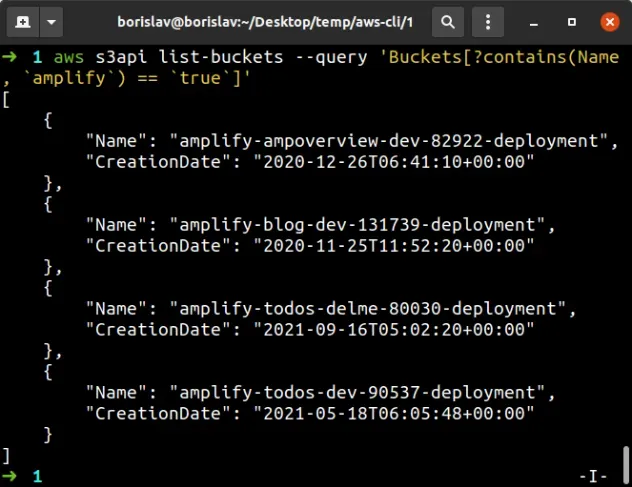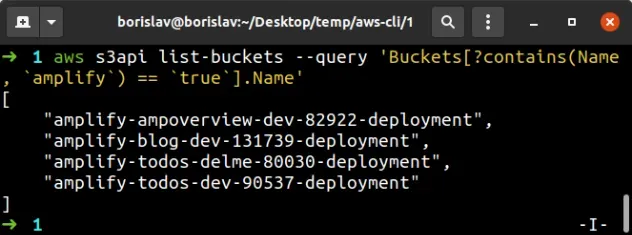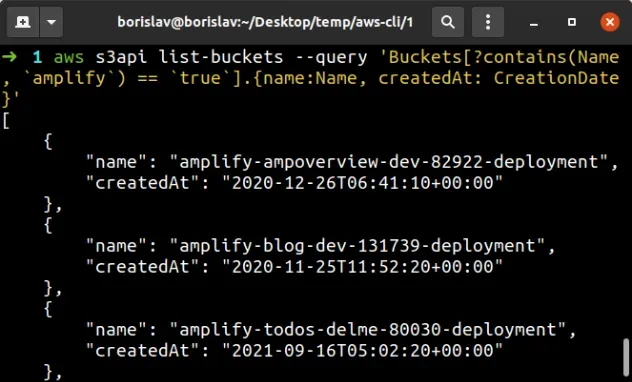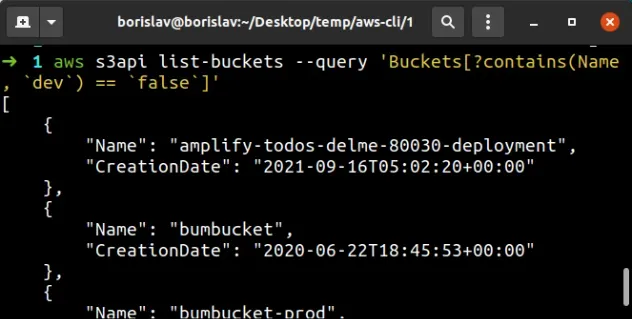Query Contains Examples with AWS CLI
Last updated: Feb 26, 2024
Reading time·3 min

# Table of Contents
# Query Contains Examples with AWS CLI
The --query parameter in AWS CLI enables us to do client-side filtering on the
JSON output the CLI returns.
To return only values that contain a certain string, use the contains
function with the --query parameter.
Let's look at an example that returns only S3 buckets that contain amplify in
their name.
aws s3api list-buckets --query 'Buckets[?contains(Name, `amplify`) == `true`]'

Note that the string we passed to the
--queryparameter is enclosed in single quotes.The second argument we passed to the
containsfunction is enclosed inbackticks.The boolean operator at the end is also enclosed in
backticks.
The --query parameter uses JMESPath. We used the
contains function.
The function applies the contains filter on the client side after the AWS CLI
has made the API call to retrieve the buckets, but before the output is returned
to the caller.
In the command above, we listed all S3 buckets and checked whether each bucket's
Name property contains the string amplify.
contains function returns true or false, so we are checking if the function returned true. If it did, then the value of the bucket's Name property contains the string amplify and should be included in the output.If we only wanted to return a list of the bucket names that contain amplify,
we can append .Name to the expression.
aws s3api list-buckets --query 'Buckets[?contains(Name, `amplify`) == `true`].Name'

Similarly, if we want to format the output in an array of objects but only pick certain properties, or rename the properties of the object, we can chain an object to the JMESPath expression.
aws s3api list-buckets --query 'Buckets[?contains(Name, `amplify`) == `true`].{name:Name, createdAt: CreationDate}'
- We filtered the results to only buckets whose
Nameproperty contains the stringamplify. - We then returned an array of objects where we renamed the
Nameproperty tonameand theCreationDateproperty tocreatedAt.

contains function works differently on strings and lists. If the first argument to contains is a string, then the function checks if the second argument is contained in that string. For instance, contains(`hello`, `hell`) returns true.contains function. For example, with a first argument of ["hello", "world"], the invocation of contains(@, `hell`) returns false# Query NOT Contains Example with AWS CLI
To filter the output of an AWS CLI command based on a string not being
contained in the results, check that the contains function returns false.
The following example lists all of my S3 Buckets where the bucket's name
doesn't contain the string dev.
aws s3api list-buckets --query 'Buckets[?contains(Name, `dev`) == `false`]'

The contains function was invoked on all of the bucket objects in the output
list.
For each bucket object, e.g. -
{"Name": "my-bucket", "CreationDate": "2020-06-..."}, the contains function
is called with the value of the bucket's Name property and the string dev.
If the value of the bucket's Name property contains the string dev, the
contains function returns true.
Since we are specifically filtering for buckets with names that don't contain
the string dev, we specified that the result of the function invocation should
evaluate to false.
# Additional Resources
You can learn more about the related topics by checking out the following tutorials:
- List all Files in an S3 Bucket with AWS CLI
- Get the Size of a Folder in AWS S3 Bucket
- How to Get the Size of an AWS S3 Bucket
- Configure CORS for an AWS S3 Bucket
- Allow Public Read access to an AWS S3 Bucket
- Copy a Local Folder to an S3 Bucket
- Download a Folder from AWS S3
- How to Rename a Folder in AWS S3
- How to Delete a Folder from an S3 Bucket
- Count Number of Objects in S3 Bucket
- AWS CDK Tutorial for Beginners - Step-by-Step Guide
- How to use Parameters in AWS CDK
- S3 Bucket Example in AWS CDK - Complete Guide
- The Following Arguments are Required - Paths Error [Solved]
- Error parsing Parameter expected = Received EOF [Solved]

